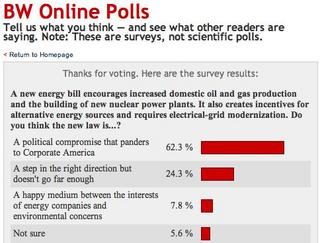The infamous knock against democracy is that after spending five minutes with the average voter you’re ready to find a new form of government. But to me, the whole point is that, to use the class I nearly failed because I didn’t cheat by studying from the previous exams that all the frats have, statistically speaking, it’s the average of voters that is important. And in that I place a great deal of confidence. That’s also why people who support highly autocratic, elitist policies fight so hard to undermine our educational system and independent media. It’s a lot easier to fool a group of uninformed voters than a group of thoughtful ones, regardless of the particulars of those thoughts.
So with that background, you can see why I loved the following poll on BusinessWeek’s website. They’re a solidly conservative publication; conservative, because they’ve thrown their lot in with the business community and wealthy Americans on a number of policy issues (for example, they recently tried to make us feel sympathetic for the top few percent of income earners in the country because they might lose some of Bush’s tax cuts due to the Alternative Minimum Tax), and solidly, because they usually stick by their principles rather than caving to whatever the Right’s talking points of the week are. I think this makes them a valuable resource for what’s going on in the business world and the perspective by which the business world views many important national and international issues.
Of course there’s nothing scientific about this and I wouldn’t advocate making policy based on web surveys. But doesn’t it say something when that many people on BusinessWeek’s website recognize the corporate welfare that is the energy bill?

1 comment:
Nate--Perhaps. Perhaps not. Don't people who usually answer polls get caught up in the whole I'm-way-smarter-than-I-really am phenemenon? And generally, don't those folks skew cynical just to impart that world-weariness that hyper-intelligent people like to project?
(Kind of like these comments I make on your blog.)
The energy bill may be a sop to corporate America but tell me what a good alternative would be that your AVERAGE joe could get behind.
This inflated period of gas prices right now is helping frame the problem. Trace the problem back from the simplest form of not having the extra $20 in your pocket on a weekly basis back through supply, distribution, exports, imports, and the byzantine laws that govern all of it. What's an average joe supposed to get behind? Doesn't he want his government doing something? Even if Amoco and Unocal and every financier on the planet gets rich or I should say, richer?
Charles (just an average joe)
Post a Comment